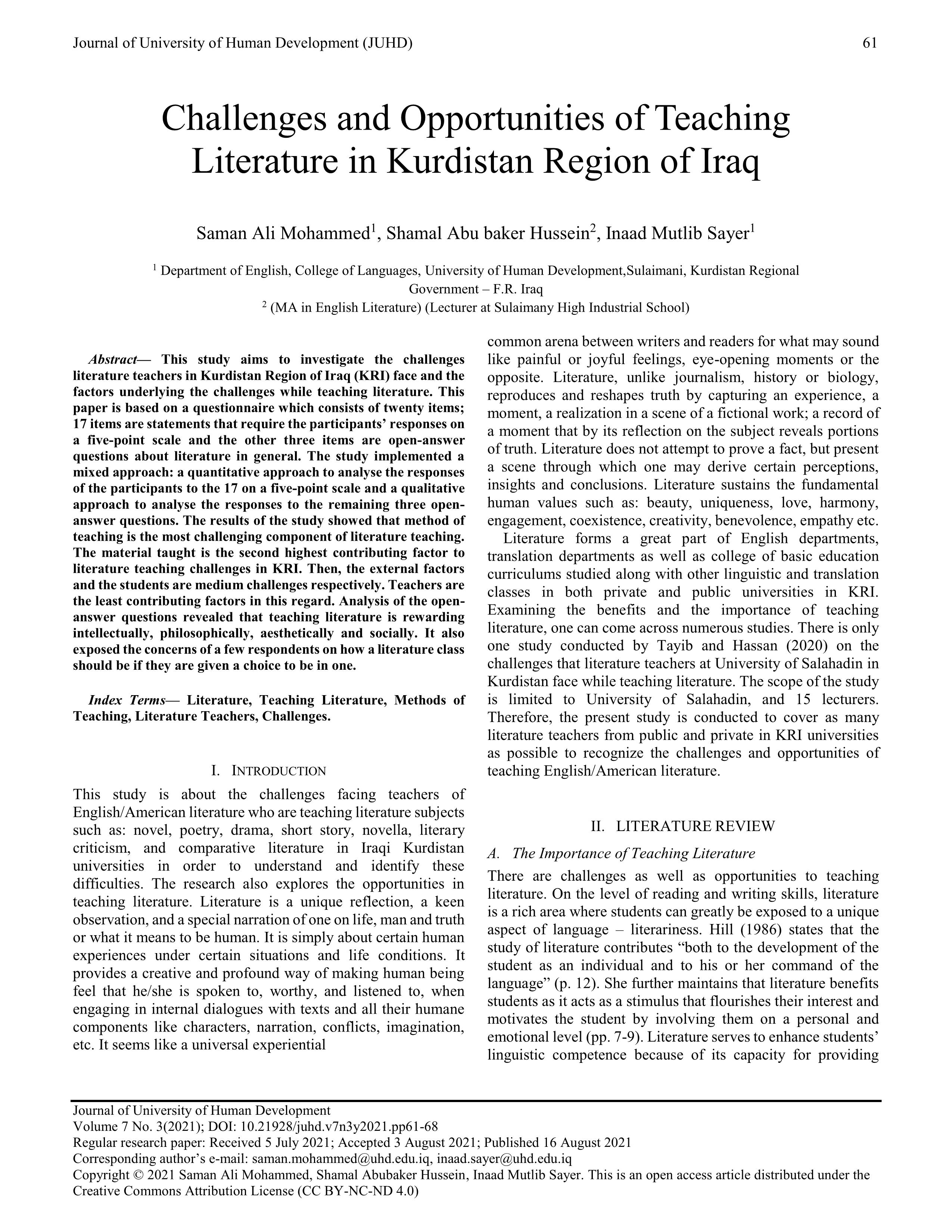Challenges and Opportunities of Teaching Literature in Kurdistan Region of Iraq
DOI:
https://doi.org/10.21928/juhd.v7n3y2021.pp61-68Keywords:
Literature, Teaching Literature, Methods of Teaching, Literature Teachers, ChallengesAbstract
This study aims to investigate the challenges literature teachers in Kurdistan Region of Iraq (KRI) face and the factors underlying the challenges while teaching literature. This paper is based on a questionnaire which consists of twenty items; 17 items are statements that require the participants’ responses on a five-point scale and the other three items are open-answer questions about literature in general. The study implemented a mixed approach: a quantitative approach to analyse the responses of the participants to the 17 on a five-point scale and a qualitative approach to analyse the responses to the remaining three open-answer questions. The results of the study showed that method of teaching is the most challenging component of literature teaching. The material taught is the second highest contributing factor to literature teaching challenges in KRI. Then, the external factors and the students are medium challenges respectively. Teachers are the least contributing factors in this regard. Analysis of the open-answer questions revealed that teaching literature is rewarding intellectually, philosophically, aesthetically and socially. It also exposed the concerns of a few respondents on how a literature class should be if they are given a choice to be in one.
References
Chesterman, A. (1983). The teaching of literature to non- native speakers. AFinLa:nVuosikirja, 135-142.
Farrar P. (1940) Aims of the teaching of literature. The High School Journal, Vol. 23, No. 2, pp. 78-83
Hill, J. (1986). Teaching literature in the language classroom. London: Macmillan.
Hoque, M. E. (2007). The use of literature in teaching English as a foreign language (TEFL). Harvest, Jahangirnagar Studies of Literature and Language. 22, 1-27.
Hussein, E. and Al-Emami, A. (2016). Challenges to teaching English literature at the University of Hail: Instructors' perspective. Arab World English Journal (AWEJ), 7 (4), 125-138.
Lazar, G. (1993). Literature and language teaching: A guide for teachers and trainers. Cambridge, England: Cambridge University Press.
Likert, R (1932). “A Technique for the Measurement of Attitudes”. Archives of Psychology. 140:1-55
Sidhu, G.K. Fook, C.U. Kaur, S. (2010). Instructional practices in teaching literature: Observations of ESL Classrooms in Malaysia. English Language Teaching, 3, (2), 54-63.
Sugandi, B. and Husnaini, (2015. Teaching Poetry in ELT Classrooms:Some Challenges and Solutions. The 3rd International Multidisciplinary Conference on Social Sciences (IMCoSS 2015) Bandar Lampung University (UBL), 1, 54-57.
Tayib C. and Hassan H, (2020). “Challenges Encountering Literature Teachers of EFL Classes in Salahaddin University/ Erbil” Twezhar Journal گۆڤاری توێژەر 3.2
Ur, Penny. (1991). A Course in language teaching: practice and theory. Cambridge: Cambridge University Press.

Downloads
Published
How to Cite
Issue
Section
License
Copyright (c) 2021 Saman Ali Mohammed, Inaad Mutlib Sayer, Shamal Abubaker Hussein

This work is licensed under a Creative Commons Attribution-NonCommercial-NoDerivatives 4.0 International License.


